Stalin recebe melhor avaliação dos cidadãos russos em 20 anos
EFE/ Tatyana Zenkovich
A figura do ditador soviético Josef Stalin é vista positivamente por mais da metade dos russos, o que representa a melhor avalição nos últimos 20 anos, segundo uma pesquisa divulgada nesta terça-feira pelo Centro Levada.
Segundo a pesquisa, realizada entre 21 e 27 de março, 51% dos entrevistados veem Stalin positivamente, dos quais 41% sentem respeito, 6% simpatia e 4% admiração.
Abaixo, a íntegra da pesquisa, em inglês, publicada no site do Centro de Pesquisa Levada:

The perception of Stalin
17.04.2018
This survey took place between March 23-27, 2018 and was conducted throughout all of Russia in both urban and rural settings. The survey was carried out among 1600 people over the age of 18 in 136 localities of 52 of the country’s regions. The survey was conducted as a personal interview in respondents’ homes. The answer distribution is presented as percentages of the number of participants along with data from previous surveys. The statistical error of these studies for a selection of 1600 people (with a probability of 0.95) does not exceed: 3.4% for indicators around 50%; 2.9% for indicators around 25%/75%; 2.0% for indicators around 10%/90%; 1.5% for indicators around 5%/95%
a.Changes in Russian Public Opinion
When looking at changes in Russians’ attitudes toward Stalin, three different periods can be observed: one defined by negative perceptions (2001-2006), one defined by indifferent attitudes (2008-2012), and one defined by positive assessments (2014-2018). While initial samples showed that every other Russian had a negative view of Stalin (the aggregate share of feelings such as “dislike”, “fear”, and “disgust” was 43%), this stance accounted for less than a quarter of all opinions in 2008-2012. After 2014, about 17-20% of respondents had a negative view of Stalin. This position reached its minimum in 2018 at 12% of the total sample.
The relative increase in the number of Russians with a positive or neutral attitude toward Stalin is a less stable and more cyclical trend (compared to the clear decline in negative attitudes). While the number of Russians with a positive view (the sum of three positions: “admiration”, “respect”, and “sympathy”) was practically four times greater than the number of those with a neutral view in 2001, indifference became the dominant attitude toward Stalin by 2008. It was replaced by a positive view in March 2014. It has been noted numerous times in the past that “post-Crimean unity” has lead to the reassessment of many events and processes in the country and its history.
In addition to its psychological dichotomy (“good”/”bad”), more complex historical-cultural and ideological narratives can be highlighted in the public perception of Stalin’s image, including his role in the Great Patriotic War, his guilt within the context of the Purges and the Great Terror, the perception of him as an “effective manager” and leader of the country.
These changes reveal only one attitude to be stable: praise for Stalin’s contributions to winning the Great Patriotic War. This assessment is stereotypical amongst Russians, and its significance has not changed substantially over the past ten years (68% in 2008 versus 64% in 2018). Conversely, acceptance of the view that Stalin is guilty of killing millions of innocent people was almost one and a half times lower in 2018 than in 2016, having dropped from 62% to 44%. At the same time, the percentage of respondents who declined to answer increased significantly (from 16% to 29%). It is worth noting that the number of respondents who struggled to answer increased in relation to all positions, although such a substantial decline in support was observed only in relation to Stalin’s culpability in the Purges and the Great Terror. This is indicated by other data, as well (for example, decreased support for the opinion that the Stalinist Purges were “a political crime that cannot be justified”).
Interesting fluctuations (that cannot yet be considered trends) were recorded in 2018 in relation to the perception of Stalin as a desirable type of leader for the country who “comes in and enforces order.” Regardless of the fact that levels of agreement with this view have not changed overall, the share of respondents who previously disagreed with this view was displaced by respondents who struggled to answer this question.
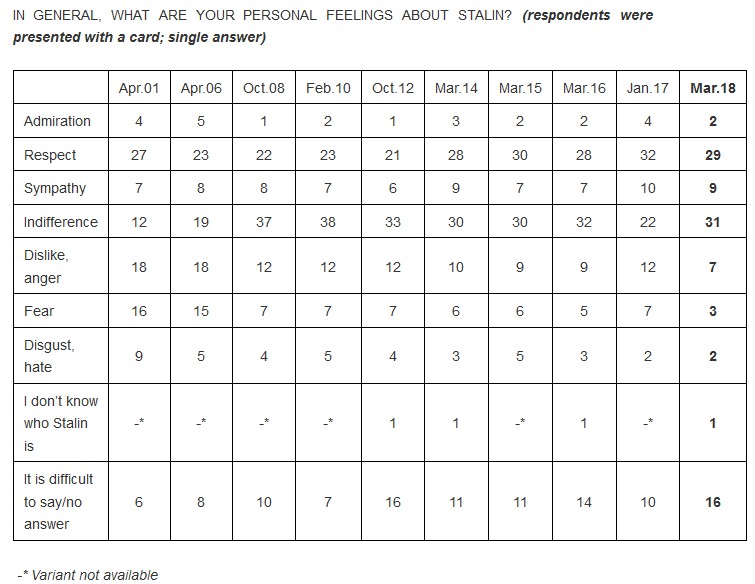
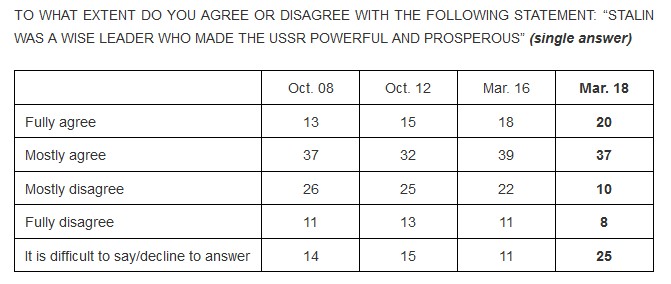
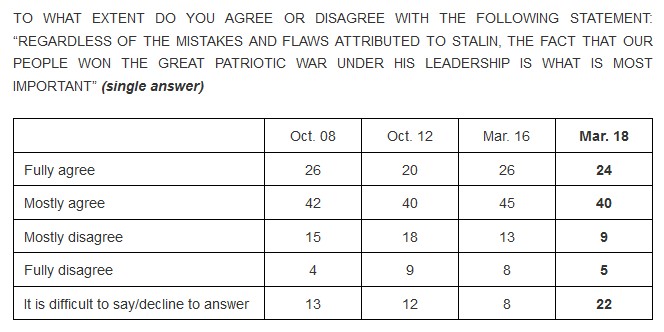
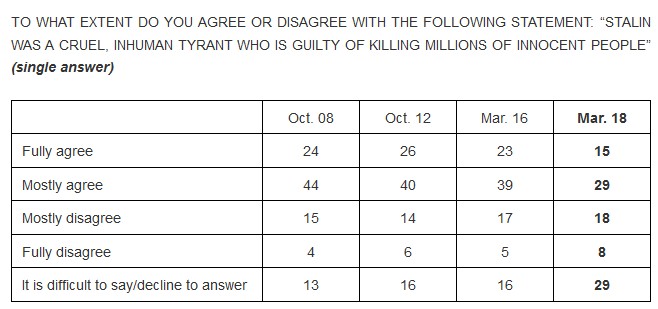
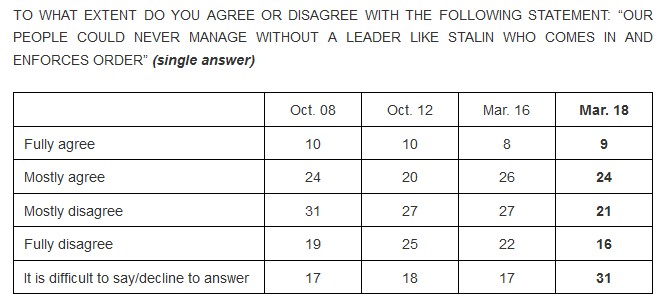
b. Unique Generational Characteristics of the Perception of Stalin in Russia
Yuri Levada’s generational theory was used to understand how to differentiate Russians’ attitudes toward Stalin. This theory covers six “significant” generations [for more information, see Yuri A. Levada’s monograph Searching for Man: Essays in Sociology 2000-2005. M., 2006]. Taking into account the fact that members of the first three generations (“the revolutionary crisis,” “the Stalinist mobilization system,” and “the war and post-war period”) are virtually gone and are not included in the samples for current mass polls, only three generations were used for analysis: “The Thaw”, “Stagnation”, and “Perestroika.” A “post-Soviet” generation, consisting of respondents born after 1991, was also added.
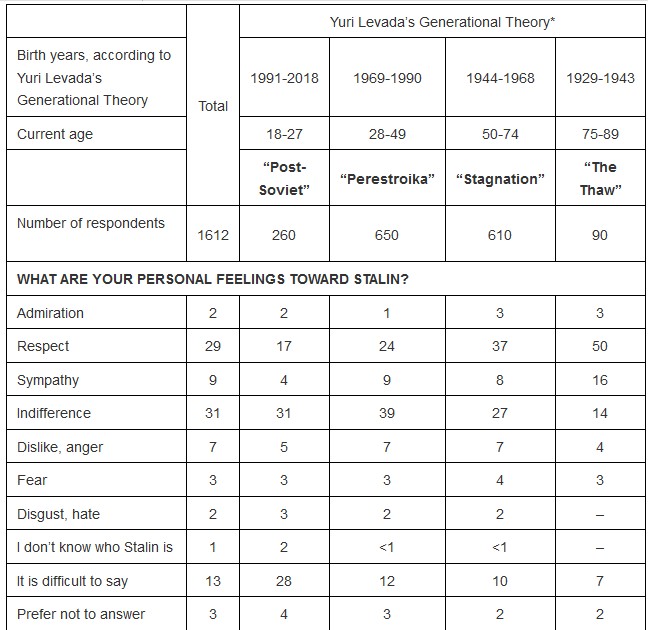
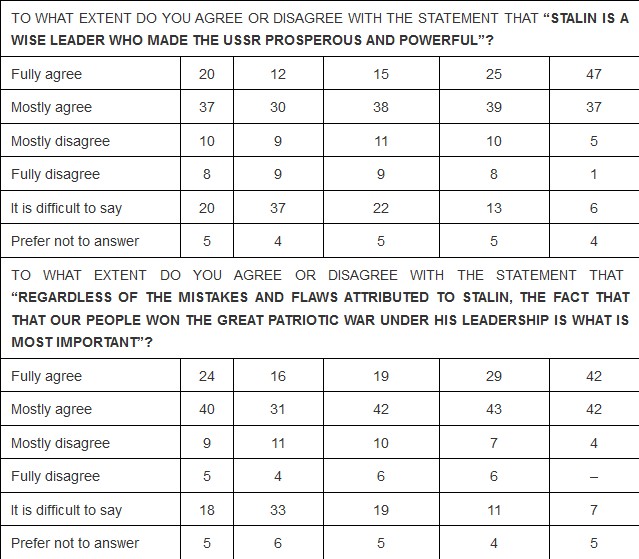
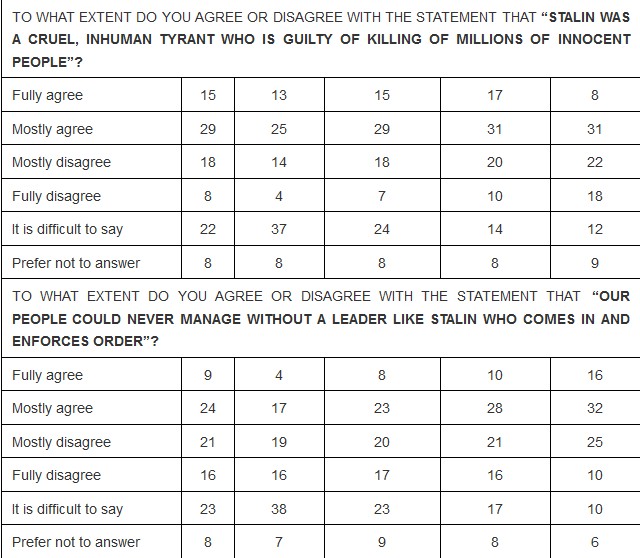
The current generational differentiation related to Stalin does not take shape on the basis of the popularization of extreme views (“positive” or “negative” perceptions), but rather on the basis of “positive” or “indifferent” attitudes, that is, people forming “a good opinion or no opinion at all” about Stalin.
A positive attitude toward the leader dominates two generations: “The Thaw” and “Stagnation.” In total, two thirds (69%) of respondents aged 75 to 89 and nearly every other respondent (48%) aged 50 to 74 had a positive view of Stalin (“admiration”, “respect”, “sympathy”). “Indifference” dominates the “Perestroika” and “post-Soviet” generations (39% and 31%, respectively). Furthermore, if declining to answer (respondents who struggled or refused to answer a given question) is considered to be an indicator of societal and moral indifference, then the total “non-judgmental” attitude toward Stalin accounts for more than half of these generational groups: 54% amongst respondents ages 28-49 and 63% amongst respondents ages 18-27. An similar age trend was recorded in relation to nostalgia for the Soviet Union; in general, this nostalgia is reported by respondents over the age of 55 (that is, people of the “Stagnation” and “Thaw” generations), while young people do not express nostalgia for the USSR.
The support of different (positive and negative) perceptions of Stalin also has some generational characteristics. Equilibrium between opinions on whether or not Stalin is guilty of killing millions of people is observed only in the “Thaw” generation: 39% percent versus 40%. Amongst members of the “Stagnation” and “Perestroika” generations, the dominant opinion is that Stalin is guilty of these deaths, while the prevailing share of the “post-Soviet” generation consists of those who struggle to express their attitude toward Stalin in the context of the Purges and victims of that time (in total, 45% of respondents struggled or declined to answer this question). There is an excessive degree of indifference amongst 18- to 27-year-olds on the subject of Stalin as a leader without whom “our people could never manage.” About 45% of respondents in this group also declined to answer. It is worth noting that this generation’s socialization period occurred only while Vladimir Putin was in power (and it is precisely amongst young people that the highest levels of support for the current president’s actions have been repeatedly observed).
The only stance pertaining to Stalin that is shared by all generations is the certainty that “our people won the Great Patriotic War under his leadership”; at least 47% of respondents in every group support this position. A sufficiently high level of consensus is observable between generations in support of the opinion that Stalin should be considered a “wise leader who made the USSR powerful and prosperous.” However, there is some significant differentiation in the level of support: the older the generation, the greater the support for this position. While the support level amongst those of the “Thaw” generation is 84%, it is twice as low for the “post-Soviet” generation (42%). Moreover, an additional 42% of that group technically declined to answer.
c. Russian and Ukrainian Public Opinion of Stalin
The public opinion research results showing Ukrainian residents’ attitudes toward Stalin belong to the Kiev International Institute of Sociology (KIIS).
Russian and Ukrainian residents’ attitudes toward Stalin are occasionally studied as part of the Levada Center and KIIS’s collaborative monitoring projects. Polls in both countries are conducted nation-wide and representative. Both use identical methodology, which allows for comparison.
There are significant differences between Russians’ and Ukrainians’ attitudes toward Stalin. While 40% of Russians have positive feelings about him (“admiration”, “respect”, and “sympathy”) and 12% have negative feelings (“dislike”, “fear”, “disgust”), Ukrainians display this ratio in reverse—14% versus 42%. The share of respondents with a neutral attitude toward Stalin or who struggled to answer was practically identical.
The support for different opinions about Stalin was significantly differentiated in both countries. Ukrainians said that “Stalin is a tyrant who is guilty of killing millions of innocent people” almost twice as often as Russians (77% versus 44%). Conversely, Ukrainians disagreed with the statements “Stalin is a wise leader who made the USSR powerful and prosperous” and ” Our people could never manage without a leader like Stalin” three and a half times more often than Russians (52% versus 18% and 59% versus 37%, respectively).
Furthermore, while the share of Russian residents that recognize Stalin’s guilt in the Purges and the Great Terror is decreasing (62% in 2016 versus 44% in 2018), this share of Ukrainian residents is increasing (69% in 2016 versus 87% in 2018).
When it comes to generational differences amongst Ukrainians (comparable to those examined in relation to Russians), the data provided by the poll bears evidence of two facts. First of all, a negative view of Stalin (“dislike”, “fear”, or “disgust”) dominates all generations without exception, although sympathy for the leader is stronger amongst Ukrainians aged 75-89 from the “Thaw” generation than in other groups. Second, belonging to a certain generation, be it “post-Soviet”, “Perestroika”, “Stagnation”, or “The Thaw”, does not affect the degree to which the opinion of Stalin as a “cruel tyrant who is guilty of killing millions of innocent people” is supported; the level of support is over 70% in all age groups.
“Post-Soviet” youth from Ukraine gave substantive (negative) evaluations of Stalin more frequently without declining to answer, which points to a great degree of collective reflection on the past and the country’s history. While virtually every other respondent in the group of Russian youth aged 18-27 either struggled or declined to answer in relation to various statements about Stalin, no more than a quarter of Ukrainian youth amongst the respondents avoided giving their opinion of the leader.
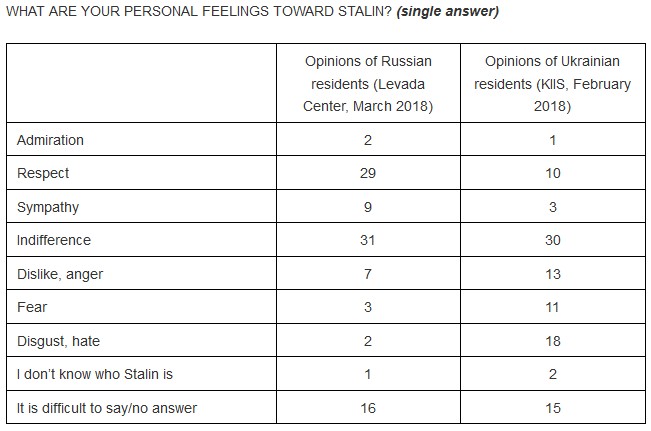
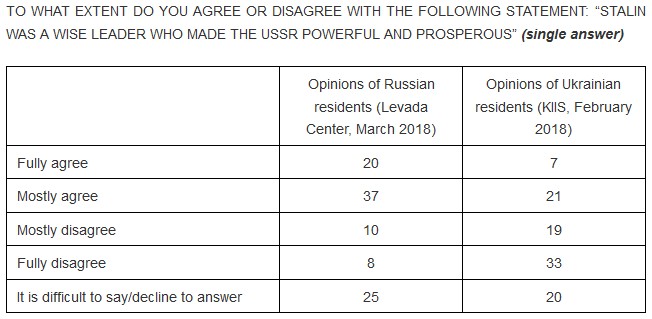
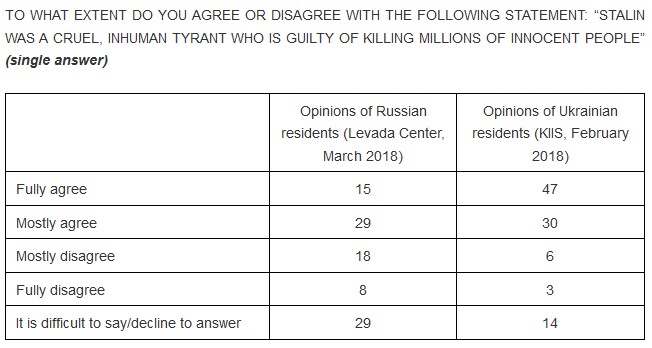
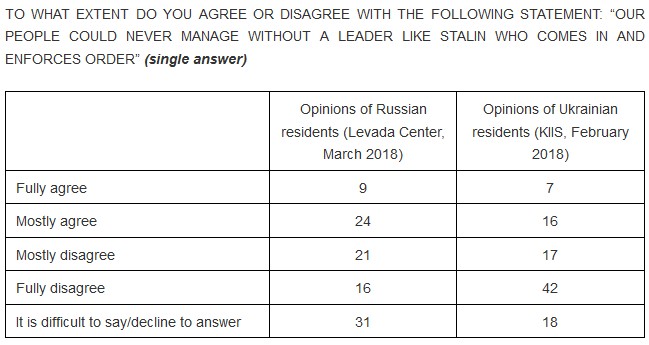
Translated by Middlebury Institute of International Studies at Monterey (formerly Monterey Institute of International Studies).
The ANO Levada Center has been forcibly included in the registry of non-commercial organizations acting as foreign agents. Read the Director of the Levada Center’s statement of disagreement with this decision here.

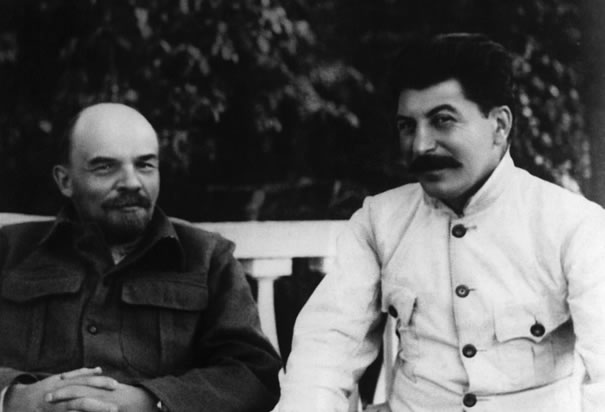
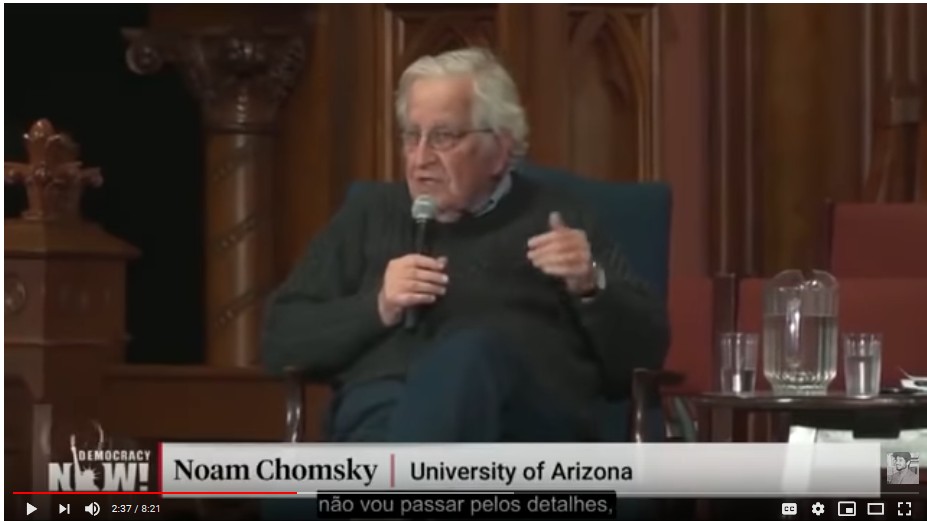



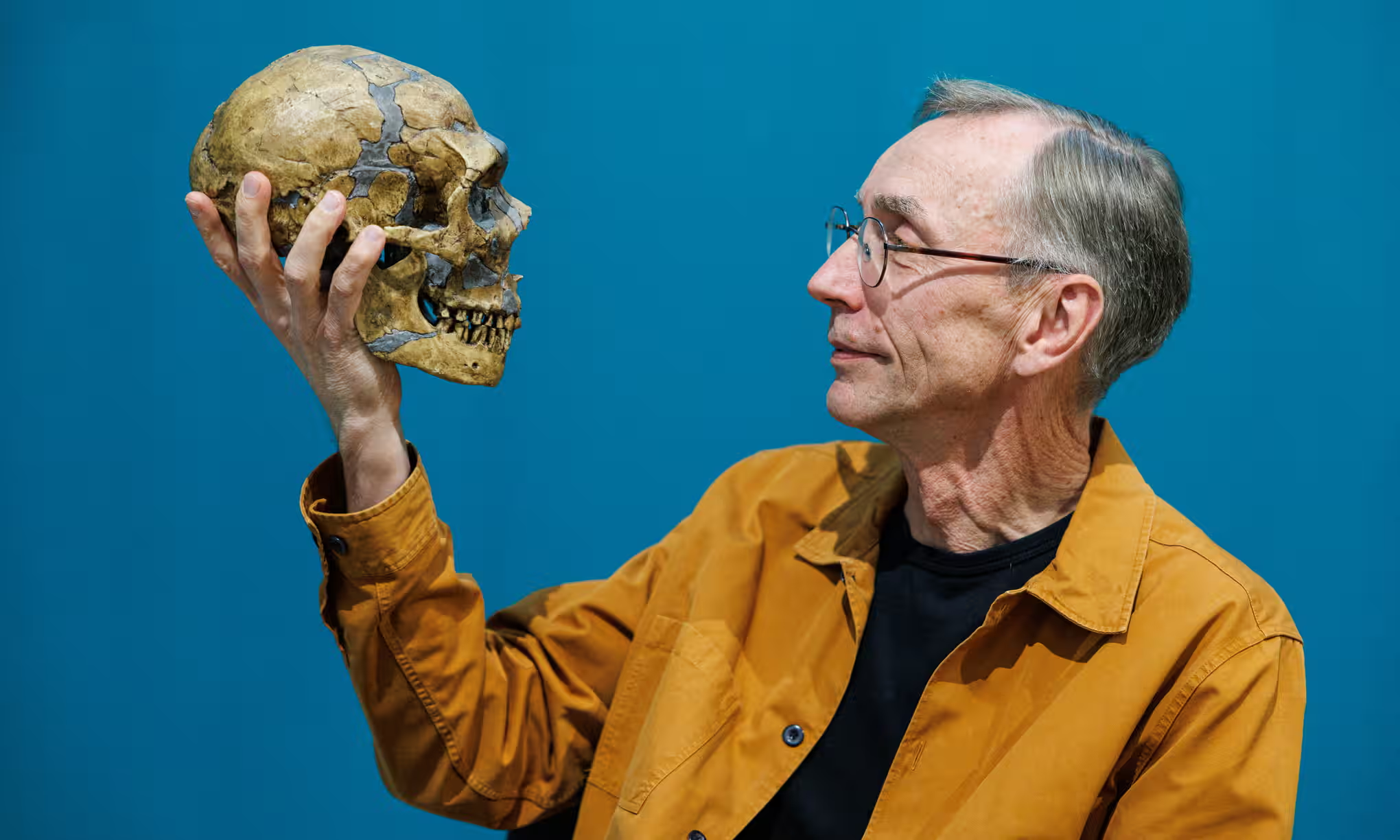


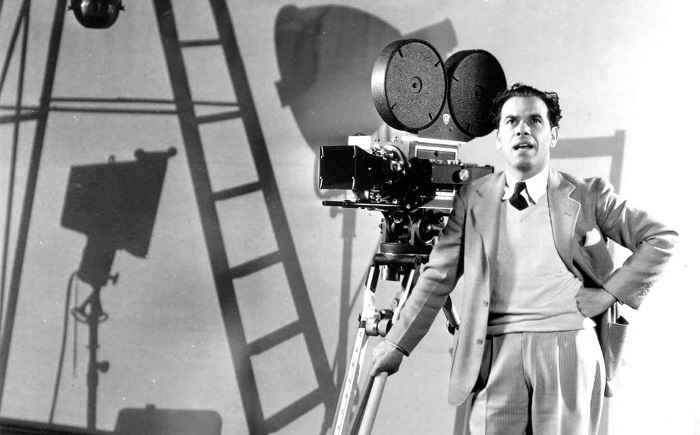
Paulo
17/04/2019 - 17h41
É, meus caros, parece que não é só o brasileiro que sofre de amnésia histórica. Certamente nenhum dos russos que não veem o cruel assassino e ditador como a escória da humanidade teve algum parente (de que se lembre, pelo menos) enviado aos Gulags…
LUPE
17/04/2019 - 13h18
Caros leitores
Digo sinceramente
que não consigo encontrar leitura confiável e fidedigna
sobre Stalin.
Muitas percebi que eram claramente falsas ,
escritas por pessoas que estavam a serviço
de denegrir Stalin e, até mesmo,
a própria União Soviética comunista.
O pouco que sei é que Stalin foi um forte líder
que esmagou várias tentativas
das nações capitalistas
de destruir a primeira nação comunista do Mundo.
Sei inclusive do episódio de um diretor de uma fábrica de caminhões que ,
provavelmente agente das nações capitalistas,
procurou meios de sabotar a produção da fábrica.
No fim Stalin estava meio paranoico,
com mania de perseguição ao regime
e a ele próprio.
Mas, daí a matar 12 milhões ,
ou trair a essência do comunismo ortodoxo que defendia
contra as opiniões mais liberalizantes de Trotsky,
vão muitas falsas informações…………
lucio
17/04/2019 - 12h21
é obvio… com a queda do comunismo e a mudança para o liberalismo de eltsin, na russia teve una MONSTRUOSA crisi de 15 anos que custou 12 milhoes de mortos (triplicou a mortalidade, isto a midia e os americanos nao contam…), porque o “democratico e liberal” eltsin botou todos os trabalhadores na rua, fechou os ospitais (que eram publicos) e entregou tudo para os assassinos privados.
só agora com putin, que re-nacionalizou muitos setores, a renda e o nivel de vida dos russos voltou o que era no comunismo.
muitos russos e ucranianos (conheço pessoalmente) tem saudades da era do comunismo. na russia o novo partido comunista é o segundo do pais.
Alan C
17/04/2019 - 11h13
Para fazermos qualquer avaliação é preciso estar ciente que 57% do nosso eleitorado votou num completo idiota…
Sergio Araujo
17/04/2019 - 11h37
O resto votou para um pluricondenado por escravidào ideologica…e depois se perguntam porque o Brasil è uma tragedia.
Hideoshi
17/04/2019 - 11h49
Ainda bem que o Brasil voltou a ser a Suíça que era antes do PT
Sergio Araujo
17/04/2019 - 12h04
Votou para pluricondenado tambèm…??
Alan C
17/04/2019 - 12h23
Hideoshi, a Genebra brasileira tá uma delícia!! rsrsr
Sergio Araujo
17/04/2019 - 12h40
Voce tambèm fez isso Alanzinho…?? Nào Acredito !! Rsrs
Sergio Araujo
17/04/2019 - 11h13
O ridiculo nào è a pesquisa, o ridiculo è que a mente de alguem pensou de fazer uma pesquisa sobre o que acham os Russos de Stalin.
luiza rocha
17/04/2019 - 09h19
É possível traduzirem?